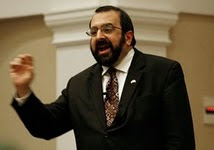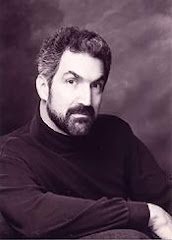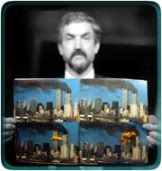

On Being a Muslim: Finding a Religious Path in the World Today by Farid Esack (1999) Oneworld Publications, Oxford.
We know there is Allah. We know there is Shaytan, the devil. We know the devil is our enemy. We know about heaven and hell. And we know that as Muslims we have to strive for justice. We have read of struggles among the early companions themselves: the struggles between Uthman and Abu Dharr, between Ali and Aisha, and then between Ali and Muawiya.
I will not expand on these examples. Why? Firstly, I do not wish to get into a historical polemic. Secondly, I don't want my Deobandi teachers and my Naqshbandi gurus to think I have gone all soft and non-sunni on them. Most of all, I would rather not have any of my family in PakiLand murdered by thugs from either Sipah-i-Sahaba or Sipah-i-Muhammadi factions! Funerals cost big money, even in Pakistan!
The point is that all these historical struggles and wars and debates and arguments were about justice, about standing up for what is right. About recognizing evil for what it is and taking a stand against it.
These and many other noble motherhood statements that fill the pages of those Islamic books churned out by hundreds of graduates of various madrasas and Islamic universities. Many of us know the titles and the authors. But how many of us know how to live all this? And how many of us understand how to live all this in the modern world of economic insecurity, cultural and religious pluralism, family break-ups, nervous breakdowns and a planet that seems to be getting smaller and smaller?
More importantly, how do we live all this without turning into self-righteous pseudo-spiritual lunatics who condemn our brother for not having a beard but are offended when anyone dares mention that Iqbal or Said Nursi or Syed Qutb were often clean-shaven around the chin?
Farid Esack has given us some pointers on how to live Islam in a way that avoids self-righteousness, moral inconsistency and hypocrisy. His book is fresh in its approach. Esack is not scared to talk about the hypocrisy of many allegedly religious people in Muslim communities. He tackles some of the tough questions of living Islam in countries like Canada, Australia and South Africa: How can we justify excluding women from the management of mosques? Should Muslims living in a Western country form their own political party? Should Muslims involve themselves in social activism with non-Muslims?
Everything about the book is refreshing. In its writing style, On Being Muslim reads more like an informal pep talk than a scholarly dissertation. But Esack is no mere talker. He has enough scholarly credentials to impress anyone. For some 10 years Esack did undergraduate studies in Karachi at some of the finest institutions in the Muslim world. He graduated from Jami'ah Alimiyyah al-Islamia with a Bachelor's Degree in Islamic Law & Theology. He went on to do post-graduate research in Qur'anic Studies at Jami'ah Abu Bakr (also in Karachi) and completed a doctoral degree in Qur'anic Hermeneutics at University of Birmingham (UK). In 1994-95 he was a Research Fellow in Biblical Hermeneutics at some place in Germany that I will probably spell incorrectly but I will have a go at it anyway: Philosophische Theologische Hochschule, Sankt Georgen, Frankfurt am Main.
As such, Esack is not only a traditional alim (itself an amazing achievement) but an accomplished scholar. But he was not content with mere scholarly pursuits. Esack took an active role in the struggle against apartheid in South Africa, at a time when many Muslims were beneficiaries of the apartheid system. There are even incidents of some Indian Muslims who did not allow their black brethren from praying in the same mosques or in the same rows.
One of the main organizations fighting against apartheid was the United Democratic Front. The UDF organized a large number of marches and other resistance activities, including an economic boycott which saw millions of blacks refusing to buy from white shopkeepers. The boycott crippled the apartheid-based economy and forced white businessmen to lobby the government in support of the UDF. Amongst the star recruits was Maulana Esack.
He spent most of the 1980s struggling for inter-religious solidarity in the struggle against apartheid. This saw him being actively involved in numerous organizations such as the UDF, The Call of Islam, the Organisation of People Against Sexism, the Cape Against Racism and the World Conference on Religion & Peace. He has been a regular political columnist for the Cape Times (weekly), Beeld and Burger (fortnightly) and other mainstream newspapers and publications in South Africa.
Esack was also involved in work within the Muslim communities of South Africa. He was a socio-religious columnist for Al Qalam, a South African Muslim monthly newspaper. He continues to write for Islamica, a British Muslim quarterly and Assalaamu Alaikum, a New York based Muslim quarterly.
Esack is one of the few articulate voices who can speak the language of a new generation of Muslims whilst not offending any but the most islamophobic non-Muslims. He is controversial. Even in his own country and within the South African Muslim communities, many regard Esack as a renegade. Regardless of (or perhaps because of) his reputation, the book is even more worth reading.
Most of the conservative Deobandi South African Memon Indian expatriates I have spoken to are full of criticism for Maulana Esack. They tell me that he supports women leading namaz (i.e. salat or 5-times daily worship). They tell me he is a communist. They tell me he hangs around with Christians. They told me all this when he was touring Australia and was getting ready to give a lecture at the University of Technology, Sydney.
Many sent me a copy of an article written by the learned English scholar Abdal Hakim Murad. In fact, this article kept cyberspace in Sydney busy for some time. The irony of Shaykh Murad's article is that it largely brands Esack as being guilty by association. And me being a controversialist, I just could not help myself. So I publicly replied that people in glass houses should not throw stones. I sent a whole heap of evidence linking Shaykh Murad to a certain infamous neo-Con shaykh who sits on the same speakers' bureau panel as other neo-Cons, an interesting dude who loves telling the State Department that we (who refuse to accept the leadership of his Islamic Supreme Council of America) are all a bunch of Wahhabis and terrorists and extremists simply because, well, simply because he feels like it!
And so when Maulana Esack did appear, half the lecture theatre was filled with Turks. All from orthodox Turkish Sufi Muslim groups that have about as much regard for the neo-Con shaykh (and his Cypriot master) as they do for the winner of the World Idol contest. Maulana Esack came out to speak and probably could not believe his luck! A theatre packed with ladies looking like something out of the Merve Kavakci Appreciation Society. Why were they there? Simple. Anyone who is criticized by a friend of a friend of neo-Cons must be worth listening to!
All this happened back in February or March 2003. The memory is still strong. And for good measure, I purchased a copy of Maulana Esack's book on the Qur'an that Shaykh Murad found somewhat distasteful. I still have not read it. But I had read On Being Muslim, and I thoroughly recommend it.
I have to say that I do find some of Maulana Esack's views on "Islamic liberation theology" a bit too creative for my liking. I cannot see how much further we can liberate that most refreshing and liberating theology of Qur'an and Sunna. Yes, we can rescue it from being hijacked by the followers of the Islaaam of double and triple vowels. And perhaps my Deobandi brethren could stop trying to please the Saudi religious officialdom and remember that their educational movement was founded by the leader of the Chishtiyya-Sabiriyya-Imdadiyya school of Sufism. Maybe the dudes who run our mosques could let ladies enter instead of pushing them up the road to the local nightspots. And one day the Mufti of Australia will learn to speak English.
People like Maulana Esack are living proof that Islam is big enough to handle the challenges of a planet that seems to be getting smaller all the time.
First published in the now-defunct MuslimWakeUp.com e-zine on 8 February 2004.
Words © 2004-08 Irfan Yusuf![]()
Bookmark this on Delicious![]()












3 comments:
Salam.
Esack came to my town in early 2003 and gave a talk. I had not heard of him, but I'll never forget the talk he gave - very thought provoking.
I didn't buy his book then, and more or less just filed him away as someone with interesting ideas that one day I may look into.
Then, earlier this year, I saw an article written by him. Instantly recognized the name and began to read it.
I must say the article was very compelling. So much so that since then I routinely scour the Internet for references to him. Unfortunately, it seems most of his writings are confined to publications that either don't have an Internet presence, or that don't get picked up by Google News.
I have to admire the man on many, many levels. Everything I read of his was worthy of thinking over.
So finally, I decided to read his book "On Being a Muslim" - a local library had it.
I must say I was sorely disappointed. You see - all his other work I had read were not written from the perspective of a (traditional) scholar of Islam. On Being a Muslim, however, almost was. He gives advice, and tries to support quite a bit of it from the Quran and the Hadith.
And that's where I got turned off. You see, I like it when people support their arguments with the Quran and/or the Hadith. However, it was clear that he was acting like many other "scholars" out there - cherry picking and interpreting things to suit his argument. In a number of cases, the evidence he cited would not seem to support his argument - but then he would invoke obscure secondary translations to obtain it. The very practice that constantly irritates me from "conventional" scholars.
This was in contrast to the articles I had read of his. Whenever he'd quote a verse, it would be plain, would fit with the context of the subject, and did not need any invokations of secondary or tertiary meanings. That's why I hoped On Being a Muslim would hold a lot of promise.
And there are other issues. I've come to realize that I can't view him as an authoritative scholar in Islam (about Islam, yes - but not of Islam in the sense of providing religious advice). To give you an idea, he quotes a Hadith in the book: "He who knows himself, knows God".
Except that it is heavily disputed as one. It is, I believe, a worse from the Old Testament. An early Sufi scholar put it in his book as a Hadith, but "conventional" scholars reject it as they have no actual evidence that the Prophet(S) ever uttered it.
Don't get me wrong - I don't disagree with most of the advice he gives in the book. I think On Being a Muslim would have been a better book had it been titled On Being a Person, and without much of his poor attempts at justifying on religious grounds the arguments he was giving.
I don't mean to post a critique of Esack himself in this comment. He still remains a thought provoking person to me, and I still wish to read and hear everything he says (if his talk is recorded and posted online, I'd appreciate you posting a link to it on this blog - it'll be picked up by Google Blogsearch). I've just come to terms with not viewing him as a person who can give definitive religious advice (which he rarely tends to - OBAM seems to be more of an exception).
It is, I believe, a worse from the Old Testament.
Eh. I meant verse.
"He has enough scholarly credentials to impress anyone."
Irfan, who are you kidding? Compare his credentials to Hamza Yusuf's and one of the comes out lacking badly.(irrespective of what one thinks about Hamza's post 9/11 change)
Post a Comment